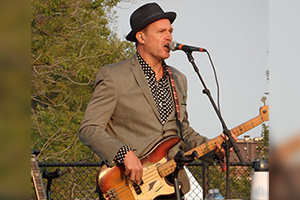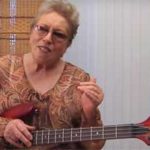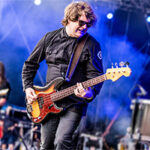Seasoned session player describes his path from little brother to Elvis Costello gig
Exclusive interview with FBPO’s Jon Liebman
January 27, 2020
Born and raised in Redlands, California, Davey Faragher was surrounded by music from the very beginning. After performing and recording several albums with his older brothers, Danny, Jimmy, and Tommy, the younger Faragher went on to enjoy a successful career as a session player and live performer. A founding member of the band Cracker in the early ‘90s, Davey was also a member of John Hiatt’s band from the mid to the late ‘90s. As a session player, Davey has recorded with The Monkees, David Crosby, John Phillips, Dusty Springfield, Bonnie Raitt, Sheryl Crow, Joan Osborne, Ronnie Montrose, Camper Van Beethoven, Allen Toussaint, Buddy Guy, and many others. His bass playing can also be heard on The Union, a Grammy-nominated collaboration with Elton John and Leon Russell. Since 2001, Davey has been the bass player with Elvis Costello & the Imposters.
FBPO: Let’s start from the beginning. You’re from California, right?
DF: Yes.
FBPO: How were you first exposed to music? You come from quite a musical family, don’t you?
DF: Yeah, I come from a musical family. I’m one of 8 kids, and I’m the 6th born. So, my brothers had bands (for) as long as I can remember, and they would rehearse in the living room. There was always a little singing and a lot of playing 45s. Music was just all around, so I just grew up in that environment.
FBPO: What were you listening to? Kids today probably don’t even know what 45s were!
DF: I was listening, first, to my older brothers’ records, the hot records of the ‘50s, and a little R&B from the ‘50s.
FBPO: Like what? Like Chuck Berry, Buddy Holly, Elvis…?
DF: All of that. Chuck Berry, Little Richard, all the rock & roll hits of the ‘50s, Neil Sedaka. We’re talking about me at 5 years old, playing. There were hundreds and hundreds of 45s, just stacks, because they were avid collectors. And we used to check out records from the library, like Fats Waller. When I was like 6 years old, I used to know all the lyrics to Fats Waller songs and imitate him. And then of course the current stuff from the ‘60s, and just right on through. Obviously, the Beatles had a big impact on my family.
FBPO: What attracted you to the bass? All the other instruments were taken, I’m guessing?
DF: Kind of. And also, I always had a good ear. I used to walk to school and come up with harmony notes for songs on my records that didn’t have harmony. I just always had sort of an ear for harmony and rhythm. I tried guitar, and I tried the drums. Nothing ever really stuck. And when, I guess I was about 13, my brother who is closest to me (in age) started forming bands, and they needed a bass player. It’s the classic story. I didn’t even really know what it was. We had this big console stereo…
FBPO: A hi-fi!
DF: Yeah, a hi-fi! And I would get down on the floor and listen for the bass. Once I keyed into it, it just sort of put everything together, the harmony, the rhythm, and the sort of passive aggressive controlling! [Laughs]
FBPO: Were you aware of the bass players of the day? They didn’t put credits on the album covers in those days.
DF: Well, at that point, as a young teenager, I would read all the album liner notes, and once I started keying into the bass, the first song I learned was “Corrina, Corrina,” by Big Joe Turner. We weren’t doing “Stairway to Heaven,” we were doing “Shake,” by Otis Redding. We were doing R&B stuff. Duck Dunn was probably my first identifiable influence.
FBPO: Did you know it was Duck Dunn at the time?
DF: Yeah, I did, because there were credits on the Otis Redding records.
FBPO: Most people back then didn’t know who James Jamerson was, they didn’t know who Carol Kaye was. Like I said, they didn’t put the names on the records.
DF: Yeah, but when you’re a geek, and you’re totally into it, you find out that shit. Duck Dunn was so great because he was elemental in a certain way. James was like the gold standard, but he was unattainable as a beginner [Laughs]. Like “Heard it Through the Grapevine” by Gladys Knight & the Pips. It took me a long time to be able to get anything close to that, but the Memphis stuff, you could figure that shit out. And I loved it as much as the Motown stuff. I got into the Motown stuff, and as I progressed, I was able to decipher it a lot better.
FBPO: What about your career, or at least getting gigs? What kind of work were you doing initially?
DF: We would play high school dances and stuff like that. It was kind of funny because we weren’t a great high school band. We were sort of in our own bubble. The shit we were into was not really what the kids our age wanted to hear, particularly. I mean they liked us, but it’s like they wanted us to play contemporary stuff, (not) the R&B stuff that we were playing. We weren’t like a top-40 band. In 1970 in a high school, or in 1972 or whenever it was, the kids didn’t want to hear Big Joe Turner. [Laughs]
FBPO: What did they want to hear, Jethro Tull and the Who?
DF: Yeah, yeah. And I was kind of slow getting into that stuff. I was into everything I heard on the radio, but when I started playing, I concentrated at first on R&B. I had never even heard “Stairway to Heaven.” We would play a dance and people would ask for that, but I had never even heard it. It just wasn’t on my radar. I was into R&B and vocal music. I thought those guys sang weird. [Laughs]
FBPO: What about when your career started to unfold and you began playing the bass professionally? What was that transition like?
DF: My older brothers had stayed in music. They had bands and they had always gotten record deals. They were in LA and they signed a major label deal. It never quite happened, but they were always kind of starting with it. The dream was there, the possibility was there. They were making records and working with Richard Perry, and guys that were doing shit, you know. And when their thing fell apart, they had had their eye on us and we’d gotten so good that they decided they wanted to do a band with us and do the kind of music that we were doing. They were songwriters and so I kind of came up doing that. I kind of came up doing records even more than performing, in a way. I was always, from a very early age, in bands that were writing their own songs and trying to do that.
FBPO: Growing up as one of 8 kids, were there years when everybody was in the house at the same time? Was it a big house, or was everybody always on top of each other?
DF: It was a big, three-story Victorian house built in 1890. It was a funny scene because we weren’t very well off. My dad worked in sales and construction. He had 8 kids and it was a struggle, but he had managed to buy this house. We lived in this pretty posh neighborhood and we were surrounded by surgeons and generals in the army because there was an Air Force base out there. It was, politically, very conservative and we were like the house with a big peace sign on it! [Laughs] When the Viet Nam war was going on, my brothers were hippies. It was a weird combination, being into R&B, but being a hippie too. We didn’t really fit into any categories.
FBPO: Cracker seems to have been a pretty big part of your career.
DF: It’s funny because those guys were from my hometown. David Lowery, the lead singer, is from my hometown, and I actually went to school with his sister, but we met in Los Angeles. This producer, Dennis Herring, asked me to come in and sing on (a) Camper Van Beethoven (recording). I really liked David and when that band broke up, I said (to Dennis), keep me in mind if you want to do something. He was putting together another band, and that’s how that happened. It was a really good, creative time for me. My involvement with the songs and being an equal member of a band is a different thing than working with an artist. They’re both great things, but it’s a different ball of wax, in a way.
FBPO: I bet it’s different from being the little brother too.
DF: Well, suddenly I was the old dude! [Laughs] I had always been the younger (one) in all the situations. I moved to LA when I was 17, so I was always working with people in their late 20s and 30s.
FBPO: The period you’re describing, is that about when things started to take off for you?
DF: Yeah, I had some success as a songwriter. I was in a band with Glen Ballard and the singer Brie Howard. We had a song that the Pointer Sisters cut. It was called “Nightline.” In the publishing world, it’s like the “fish that got away” story.
FBPO: Can you share that story?
DF: We wrote this song and it was just really hot. We had a deal with MCA Publishing and it just sort of hit some mark where a lot of people were really interested in it. Michael Jackson cut it for Thriller. It didn’t go on Thriller, but Quincy Jones still had a hold on the song. Phil Ramone asked to use it on Flashdance, and because Quincy had a hold on it, he let go. And then the Pointer Sisters cut it, and it was the title track of their album. But because there was a version out there, an earlier version, nothing had happened. Randy Crawford cut the song and rush-released it. It was an okay version, (but) it wasn’t the ultimate version of the song, really. It became a low priority for the Pointer Sisters. The album went gold, but after that, they took our song off it and re-released the album with “I’m So Excited” and that became a big album. So, I’m driving around the Valley in my ’63 Pontiac and everything on the radio is like Michael Jackson’s “Thriller,” the Pointer Sisters, “Flashdance,” all these major things that this song was weaving in and out of, and didn’t quite hit.
FBPO: So close.
DF: Yeah, so close! Anyway, I was having a little bit of success, but not that much financial success. I toured with David Crosby, so I was starting to get gigs and things.
FBPO: What was the David Crosby gig like?
DF: He was really great. He had just gotten out of jail. It was the first tour he did after he got out of jail.
FBPO: That would have been about what year?
DF: ’86, or ’87 maybe? Right around then. He was great. He would sing so great. He was really nice to me. It was the first time I’d really gone on a tour, like on a tour bus. I was pretty green in that arena. We would do soundcheck, and then eat dinner, and then he’d go back out on the bus and go to sleep right up until it was time to get onstage. His wife would go to the back of the bus and wake him up. He’d stand up and he had on like a fisherman’s vest or something, and his hair would be sticking straight up. Maybe there’s mustard on his shirt from dinner or something. He’s just walking like a zombie down the bus with his wife kind of pushing him off, you know, futzing with his hair a little bit. He just walks off the bus, through the stage door, they put a guitar on him and – he started the show by himself – and he walks out onstage and then opens his mouth and signs like a fucking bird! [Laughs]
FBPO: How are you enjoying the Elvis Costello gig?
DF: It’s been a great experience for me. He gives me a lot of latitude when we record, and vocally. It’s a pretty fun relationship in that way, musically.
FBPO: Let’s talk about your gear. Tell me what you’re playing.
DF: I’m a Fender guy. I’ve got a ’58 P bass that I’ve been playing since 1975. Lately I’ve been playing this Mike DeTemple bass. He’s a guitar maker here in LA. He hasn’t really made that many basses. I use D’Addario flatwound strings. On my P bass I use roundwounds.
FBPO: How about amps?
DF: Ampeg.
FBPO: You’re not too big on effects and processors and stuff, are you?
DF: Not particularly. I’ve done records where I’ve used fuzz quite a bit, like I did on this record with Buddy Guy.
FBPO: What else is keeping you busy, in between Elvis gigs and tours?
DF: I’ve got Jack Shit, which is a band I’ve been in longer than anything I’ve done. It’s the drummer from Elvis (Pete Thomas), and this guitarist, Val McCallum. We started Jack Shit before I started playing with Elvis. In fact, we did a Jack Shit gig in London because we were touring with Vonda Shepard from Ally McBeal, me and Pete. We did a Jack Shit gig in London and Elvis came down and sat in with us. That was one of the first encounters I had with him.
FBPO: What about the future? What else would you like to do that you haven’t already accomplished?
DF: I’d like to just kind of keep doing it, basically. I’d love to get in more of a songwriting kind of situation again. I kind of miss doing that. Elvis is so… he doesn’t need anybody else in that department! He comes to us with songs, and that’s great. That’s the gig. I do miss being involved in that aspect of it.
FBPO: What do you think is most important for someone who wants to learn bass?
DF: Listening is the main thing. Listening, and emulating, and practicing. One door leads to the next door. You start out by listening to a record and then trying to figure it out. I’m a big proponent of lessons. I think lessons are a good thing. Getting the fundamentals down. Figuring out how to get a tone. So much of it is about the finger pressing the fretboard. It sounds so obvious, but people kind of skip over that part. You have to be able to produce a tone before you go on to the next note. It is about learning the lick, but it’s also about playing it like you’re singing it, and giving the notes their true value, not just fumbling through the notes. Start out slow. When you’re learning a riff, play it as slowly as you need to that you play it perfectly, then gradually speed it up.
FBPO: What would you be if you weren’t a bass player?
DF: I’d be a cook! I’m a big foodie and I’ve cooked all my life. I’ve got a wood-burning pizza oven at my house, I bake bread, I just have always been into it.
See Jon’s blog, with key takeaways from this interview, here.





